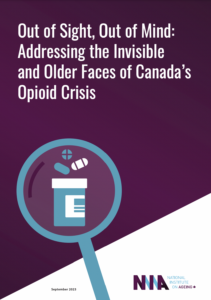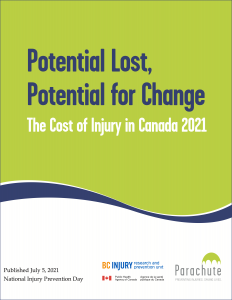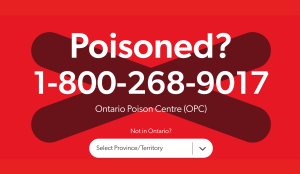Collection at a glance:
All resources
-
Pan-Canadian Poison Centres 2022 Annual Report
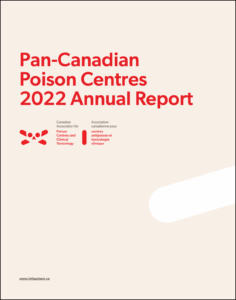
This report, produced by the Canadian Association for Poison Centres and Clinical Toxicologists, Health Canada and Parachute, presents the most current data (2022) from all five of Canada’s poison centres. The report provides an overview of the number and nature of cases managed by poison centres across Canada and highlights the role of these centres in poison prevention efforts.
2.49 MB PDF
-
Creating Safe Environments: Indigenous Programs Virtual Learning (2024)
This webinar series from the Canadian Red Cross National Indigenous Programs Team details learnings, resources and tools regarding opioid harm reduction
-
Support Opioid Harm Reduction
Canadian Red Cross Opioid Harm Reduction training aims to reduce opioid-related deaths by eliminating stigma, promoting helpful behaviors, and training on how to administer naloxone.
-
Reducing cannabis and chemical exposure risks in Canada: Strategies and resources for public safety (2024)
Unintended exposures to cannabis and to chemicals and pollutants in and around the home pose risks to public health and safety in Canada. Hosted by Sarah Macdonald from Parachute, this webinar will highlight two Health Canada initiatives targeting risk management and reduction in these areas.
First, presenter Sieara Plebon-Huff, Scientific Evaluator in Health Canada’s Office of Cannabis Science and Surveillance – Pharmacovigilance Division, will introduce participants to Health Canada’s Vigilance Framework for Cannabis. Participants will hear about data findings, key issues (e.g., pediatric cannabis exposures), and activities and resources developed by the program to help track and mitigate these exposures.
Second, presenters Odette Bose and Heloise Tachaeur from Health Canada’s Environmental Health Program will share outreach activities conducted under the Chemicals Management Plan aimed at helping people reduce environmental risks posed by chemicals and pollutants in and around the home. Participants will learn about the resources and tools used by Risk Communication and Public Involvement Officers to support public outreach and engagement for poison prevention awareness and chemical exposure reduction.
Presenters:
Sieara Plebon-Huff
Scientific Evaluator, Controlled Substances and Cannabis Branch, Health CanadaOdette Bose
Risk Communication and Public Involvement Officer in Alberta and North region, Regulatory, Operations and Enforcement Branch, Health CanadaHeloise Tachaeur
Risk Communication and Public Involvement Officer in Ontario, Regulatory, Operations and Enforcement Branch, Health Canada -
Drug checking: Harm reduction practices for unregulated drug use at Canadian music festivals (2024)
Each year, British Columbia is home to two of the largest electronic music festivals in Canada. At these events, drug use is an integral part of the culture and most attendees interact with drugs in one way or another. The death of at least five young adults in 2014 at music festivals in Canada, where drug use was likely a contributing factor, spurred a national effort to establish evidence-based harm reduction strategies for drug use at music festivals. Drug checking, a non-judgemental and nuanced chemical analysis of substances that allows people to know what is in their substances and potentially take action to reduce the risk of any related harms, emerged out of this work. In addition to potentially helping prevent substance-related toxicity, the analysis of drug checking data contributes to understanding of the types and contents of substances used in music festival settings.
Hosted by Sarah Macdonald from Parachute, this webinar will provide insight into the development of evidence-based harm reduction strategies at music festivals and share learnings from the implementation of drug checking, in particular. The webinar will include presentations from Antoine Marcheterre, Drug Checking Lead, Interior Health and Jarred Aasen, Pharmacist, Founder of Lantern Services and Co-Founder/Co-Author of the Drug Resource and Education (DRED) Project. A Q&A session will follow their presentations. With a focus on drug use prevalence and poison prevention at music festivals, the presentations will emphasize a philosophy of taking up non-prohibitive methods to keep people safe.
Presenters:
Antoine Marcheterre, Drug Checking Lead, Interior Health
Jarred Aasen, Licenced Pharmacist, Founder of Lantern Services, Co-Founder/Co-Author of the Drug Resource and Education (DRED) Project -
Pan-Canadian Poison Centres 2021 Annual Report
This report, produced by the Canadian Association of Poison Centres and Clinical Toxicologists, Health Canada and Parachute, presents the most current data (2021) from all five of Canada’s poison centres. The report provides an overview of the number and nature of cases managed by posion centres across Canada and highlights the role of these centres in poison prevention efforts.
-
Carbon monoxide poisoning: Trends and responses in Canada (2023)
Carbon monoxide (CO), often called “the silent killer”, is a leading cause of unintentional poisoning deaths in Canada and North America. Hosted by Stephanie Cowle from Parachute, this webinar will explore CO poisoning trends and responses from multiple perspectives, including poison centre responses to emergency weather events, a case study examining CO health literacy among homeowners and gaps relating to CO legislation in Canada. The speakers will cover key messages for preventing future occurrences, as well as opportunities for collaboration and action. A Q&A sessison will follow the presentations.
-
Out of Sight, Out of Mind: Addressing the Invisible and Older Faces of Canada’s Opioid Crisis (2023)
-
Trends and responses to unintentional pediatric analgesic poisonings (2023)
Medications are the leading cause of poisoning in Canada. Medications that relieve pain, known as analgesics, are the No. 1 substance Canada’s poison centres receive calls about. Hosted by Patti Stark from the Injury Prevention Centre in Alberta and Pamela Fuselli from Parachute, this webinar will feature panellists from the Ontario Poison Centre, Atlantic Canada Poison Centre, Centre antipoison due Québec and the Institute for Safe Medication Practices Canada.
The webinar will provide an overview of trends, data and responses to unintentional analgesic poisonings among pediatric populations. Key messages for parents and caregivers will be highlighted as well as opportunities for collaboration and action.
Learning objectives will include:
- Understanding the burden and trend of unintentional analgesic related poisonings among pediatric populations in Canada
- Key messages for parents and caregivers on how to prevent analgesic poisonings
- Identifying opportunities for engaging stakeholders, such as pharmacists, in raising awareness and preventing analgesic poisonings
Panellists include:
- Jacqueline Burke, Certified Specialist in Poison Information, Ontario Poison Centre
- Audrée Elliot, Pharmacist, Centre antipoison du Québec (CAPQ)
- Laurie Mosher, Certified Specialist in Poison Information, Atlantic Canada Poison Centre
- Alice Watt, Senior Medication Safety Specialist, Institute for Safe Medication Practices Canada (ISMP Canada)
-
Trends in Canada’s drug supply, polysubstance use and unintentional drug poisonings (2023)
Unintentional drug poisonings remain one of Canada’s most devastating public health issues. Hosted by Parachute and featuring presentations from Emily Biggar, Chealsea De Moor and Doris Payer from the Canadian Centre for Substance Use and Addiction, this webinar will provide an overview of emerging trends in Canada’s unregulated drug supply, polysubstance use and harms related to unintentional drug poisonings. Implications for reducing harms to people who use drugs and practising non-stigmatizing language around substance use will be highlighted.
Panelists
Emily Biggar, MPH
Research and Policy Analyst
Canadian Centre on Substance Use and Addiction (CCSA)Chealsea De Moor, MA
Knowledge Broker
Canadian Centre on Substance Use and Addiction (CCSA)Doris Payer, PhD
Senior Knowledge Broker
Canadian Centre on Substance Use and Addiction (CCSA) -
The brave new world of content creation: Connecting with our audiences in a saturated media environment (2022)
The average American sees up to 10,000 advertisements, brands, messages or more a day. Fortune 500 companies spend billions of dollars to get their messages heard. So, how can a non-profit with little to no budget break through and connect to their audiences, supporters and the public?
This webinar, hosted by Laurie Mosher, a Specialist in Poison Information at the Atlantic Canada Poison Centre, will feature a presentation from Mike McCormick from the Florida Poison Information Center on how organizations can be more effective in their health messaging.
Emotional content creation is the key for us to share our important healthcare messages. Sharing our story in a disciplined, disruptive and distinct manner is the key to getting above the noise. The fundamentals of producing clear, concise, clean and contextual messages are more important than the dissemination medium. This session will focus on a method of content creation to cut through the clutter.
-
Pan-Canadian Poison Centres 2020 Annual Report
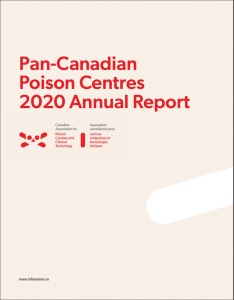
This report, produced by the Canadian Association of Poison Centres and Clinical Toxicologists, Health Canada and Parachute, presents the most current data (2020) from all five of Canada’s poison centres. The report provides an overview of the number and nature of cases managed by posion centres across Canada and highlights the role of these centres in poison prevention efforts.
-
Report a health and safety concern – Health Canada
-
Submit questions or concerns about cannabis
The Government of Canada provides contact information for questions and concerns about a cannabis site, product, service, accessory, promotion, or other aspects of laws and regulations regarding cannabis.
-
Polysubstance use poisoning deaths in Canada: an analysis of trends from 2014 to 2017 using mortality data
This study published in BMC Public Health examines changes over time in crude mortality rates and proportions of poisoning deaths involving more than one substance.
-
Institute for Safe Medication Practices Canada
The Institute for Safe Medication Practices Canada (ISMP Canada) is an independent national not-for-profit organization committed to the advancement of medication safety in all healthcare settings.
-
Canadian Centre on Substance Use and Addiction
CCSA is a non-governmental organization providing national leadership on substance use and advancing solutions to address alcohol- and other drug-related harms.
-
Child Safety Link
Child Safety Link works with the IWK Regional Poison Centre to help educate Maritime communities about poisoning prevention. The CSL website has information, resources and videos about preventing poisoning in children.
-
Injury Prevention Centre (IPC)
The Injury Prevention Centre website has resources and toolkits about poisoning related to cannabis, medications, and household products.
-
BC Injury Research and Prevention Unit (BCIRPU)
The BC Injury Research and Prevention Unit website has data and research on poisoning for all age groups.
-
Atlantic Canada Poison Centre, Nova Scotia
The Atlantic Canada Poison Centre provides a 24-hour, phone consultation service to both the public and health professionals in Newfoundland and Labrador, Nova Scotia and Prince Edward Island. They provide consult services for health care professionals in New Brunswick concerning the management of poisoned patients.
-
BC Drug and Poison Information Centre (DPIC)
The BC Drug and Poison Information Centre operates a 24-hour poison information line, as well as a drug information line for BC healthcare professionals. The BC DPIC website provides information and resources on poisoning and prevention, and serves B.C. and Yukon.
-
Sentinel Surveillance of Substance-Related Poisonings in Canada: Spotlight on Cannabis
This surveillance summary presents statistics from April 2011 onward on poisonings from select substances including cannabis, alcohol, methamphetamine, opioids and e-cigarette/vaping products.
-
Increases in exposure calls related to selected cleaners and disinfectants at the onset of the COVID-19 pandemic: data from Canadian poison centres
This study published in Health Promotion and Chronic Disease Prevention in Canada presents results from poison centre data related to cleaning products for the years 2019-2020.
-
Opioid and Stimulant-related Harms in Canada – PHAC
This update presents available data on overdoses and deaths involving opioids and/or stimulants from January 2016 to June 2025.
-
Guidelines for establishing a poison centre
This 174-page publication by the World Health Organization provides information on the services that may be offered by a poison centre as well as detailed practical guidance on planning and operations.
-
Report a medication incident – ISMP Canada
The Institute for Safe Medication Practices Canada provides links to confidential reporting systems for health professionals, pharmacies, healthcare facilities, coroners and medical examiners, and the general public.
-
Recalls and safety alerts – Health Canada
This Government of Canada website allows you to browse or search product recalls, advisories and alerts.
-
Cost of Injury in Canada 2021
-
Five questions to ask about your medications
ISMP Canada, the Canadian Patient Safety Institute, Patients for Patient Safety Canada, the Canadian Pharmacists Association and the Canadian Society for Hospital Pharmacists have collaborated to develop a set of 5 questions to help patients and caregivers start a conversation about medications to improve communications with their health care provider.
-
Poison prevention policy
Examine the issue of unintentional poisonings, the particular risk to children, and solutions to prevent poisonings
-
Carbon monoxide alarm legislation
-
Cannabis & edibles poison prevention: Exploring parent attitudes and behaviours (2022)
Since the legalization and regulation of cannabis in 2018 and edible cannabis products in 2019, unintentional cannabis exposures in young children have increased. This webinar, hosted by Parachute, will explore key data findings from a 2021 survey of parents/caregivers regarding their cannabis use, storage habits and perceptions of unintentional cannabis exposure risk for young children.
The webinar will also provide an in-depth look at child cannabis poisoning trends and key issues, poison centre information and data from across Canada and recommended actions for cannabis poison prevention, as well as priorities for cannabis poison surveillance and prevention.
SPEAKERS
Stephanie Cowle
Director of Knowledge Translation, ParachuteMargaret Thompson
Medical Director, Ontario Poison CentreJacqueline Burke
Certified Specialist in Poison Information
Ontario Poison CentreAndrea Taylor
Acting Senior Policy Analyst, Health Canada -
Exploring illegal cannabis packaging, products and sellers (2022)
The legalization of cannabis in 2018 and cannabis edibles in 2019 was accompanied by regulation on cannabis production, distribution and packaging. However, illicit cannabis products continue to make their way into the Canadian market and consumers’ homes. Illegal cannabis products are often packaged to look like popular brands of candies, snacks or other food products or have more than the allowable limit of THC per package. These products pose a risk to Canadians, particularly young children who may mistakenly consume them.
This webinar, hosted by Parachute, will review the legal requirements for cannabis products, packaging and sellers in Canada and explore the impact of illegal products. Featuring presentations from the RCMP and IWK Poison Centre, the webinar will provide an in-depth look at the history and rationale of packaging requirements as well as the response of poison centres to illegal cannabis products.
-
Notable poisoning trends: what you need to know (2022)
This webinar covered three notable trends in poisoning: medication-related poisonings; youth self-harm poisoning hospitalizations; and essential oils-related poisonings and complaints.
-
Poison Prevention – It’s Not Just For Poison Prevention Week (2021)
The “Poison Prevention – It’s Not Just For Poison Prevention Week” webinar, hosted by Parachute and the Injury Prevention Centre, will bring together partners from across Canada to share their activities for Poison Prevention Week 2021 and ideas for how to continue to promote poison prevention to parents, caregivers and others, year-round.
-
Surveillance to Action: Canada’s response to emerging poisoning issues during COVID-19 (2021)
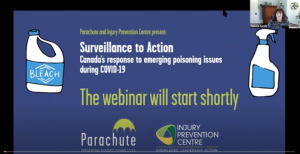
This 90-minute webinar hosted by Parachute and the Injury Prevention Centre on Feb. 26, 2021, focused on how The COVID-19 pandemic has introduced new poison prevention challenges, with more time spent at home and the introduction of more household cleaners, bleaches and hand sanitizers than ever before. The 11 panelists, including several from Health Canada, addressed how poison-related issues are reported and addressed in Canada discussed the timely detection of dangerous products, the development of public advisories and outreach, the process of stop sales and recalling non-compliant products, developing new policy, and the value of information sharing and collaboration in poison prevention.
-
Cannabis and kids: Parent Survey 2022
Find out about parents’ understanding of the dangers of cannabis edibles for children, and learn how to safely store cannabis products away from kids.
81.32 KB PDF/UA
-
Poisoning Prevention in Canada: Data, trends and calls to action (2021)
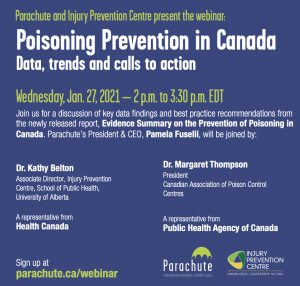
This January 2021 webinar features a discussion of key data findings and best practice recommendations from the Evidence Summary on the Prevention of Poisoning in Canada. Featuring Parachute President and CEO Pamela Fuselli, Dr. Kathy Belton of the Injury Prevention Centre, Alberta, Dr, Margaret Thompson, President of the Canadian Association of Poison Centres, and representatives from Health Canada and the Public Health Agency of Canada.
-
Evidence Summary on the Prevention of Poisoning in Canada (2020)
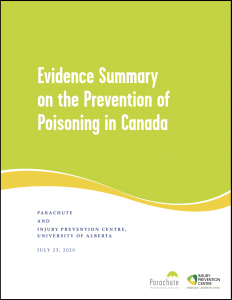
This 2020 report, written by Parachute and the Injury Prevention Centre at University of Alberta, draws together statistics and research on poisonings in Canada and documents prevention work and strategies, both underway and recommended. One key finding reveals that twice as many people in Canada now die from unintentional poisoning, driven mostly by increase in opioid use, than from transport-related injuries.
4.48 MB PDF/UA
-
Ontario Poison Centre
Serving Ontario, Manitoba, and Nunavut, this website has information for families and health professionals, including common causes of poisoning in Ontario.
-
Québec Poison Control Centre
The Québec Poison Control Centre website has information and resources on poison prevention; basic information is provided in English and French, with extensive resources for professionals in French.
-
Saskatchewan Prevention Institute: Poisoning
The SPI Poisoning webpage has provincial data on child poisonings and downloadable fact sheets, posters and activities.
-
Poison and Drug Information Service (PADIS), Alberta
From Alberta Health Services, the webpage has information about PADIS services and answers to frequently asked questions. PADIS serves Alberta, Saskatchewan and the Northwest Territories.
-
Canadian Association for Poison Centres and Clinical Toxicology
